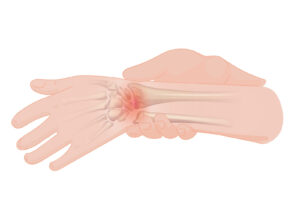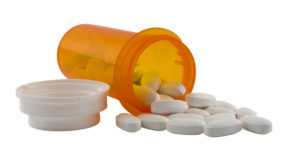 An interesting study that showed that when gut microbes are deprived of dietary fiber (their food) they start to eat the natural layer of mucus that lines the colon. (The colon is part of the large intestine). This is important because the colon's mucus layer normally acts as a barrier to pathogenic microbes. Yes, it was done in mice, but the researchers feel that this study accurately models what also happens in humans. Their conclusion: when the microbes in the gut don't get enough dietary fiber from plants (such as whole grains, fruits, vegetables, seeds, nuts), then the microbes feed on the colon's mucus layer, which results in inflammation and makes the colon more vulnerable to pathogenic (disease causing) microbes. This is what some people refer to as "leaky gut".
An interesting study that showed that when gut microbes are deprived of dietary fiber (their food) they start to eat the natural layer of mucus that lines the colon. (The colon is part of the large intestine). This is important because the colon's mucus layer normally acts as a barrier to pathogenic microbes. Yes, it was done in mice, but the researchers feel that this study accurately models what also happens in humans. Their conclusion: when the microbes in the gut don't get enough dietary fiber from plants (such as whole grains, fruits, vegetables, seeds, nuts), then the microbes feed on the colon's mucus layer, which results in inflammation and makes the colon more vulnerable to pathogenic (disease causing) microbes. This is what some people refer to as "leaky gut".
Research shows that changes in the diet (high fiber vs low fiber) quickly results in changes in the gut microbes in humans and rodents - so it's important to consistently eat a lot of a variety of plant fiber. Currently the recommended daily fiber intake for adults is for 28 to 35 grams (chart of some high fiber foods). They found that some bacteria strains flourished the best in low or no fiber conditions and it was these bacteria that were involved in breaking down the mucus layer. The research also showed that what are called "prebiotics" (purified forms of soluble fiber similar to what some processed foods and supplements contain) also resulted in thinning of the colon's mucus layer - they did not properly feed the gut microbes. From Medical Xpress:
High-fiber diet keeps gut microbes from eating colon's lining, protects against infection
It sounds like the plot of a 1950s science fiction movie: normal, helpful bacteria that begin to eat their host from within, because they don't get what they want. But new research shows that's exactly what happens when microbes inside the digestive system don't get the natural fiber that they rely on for food. Starved, they begin to munch on the natural layer of mucus that lines the gut, eroding it to the point where dangerous invading bacteria can infect the colon wall. In a new paper in Cell, an international team of researchers show the impact of fiber deprivation on the guts of specially raised mice. The mice were born and raised with no gut microbes of their own, then received a transplant of 14 bacteria that normally grow in the human gut.
The findings have implications for understanding not only the role of fiber in a normal diet, but also the potential of using fiber to counter the effects of digestive tract disorders. "The lesson we're learning from studying the interaction of fiber, gut microbes and the intestinal barrier system is that if you don't feed them, they can eat you," says Eric Martens, Ph.D., an associate professor of microbiology at the University of Michigan Medical School....Using U-M's special gnotobiotic, or germ-free, mouse facility, and advanced genetic techniques that allowed them to determine which bacteria were present and active under different conditions, they studied the impact of diets with different fiber content - and those with no fiber. They also infected some of the mice with a bacterial strain that does to mice what certain strains of Escherichia coli can do to humans - cause gut infections that lead to irritation, inflammation, diarrhea and more.
The result: the mucus layer stayed thick, and the infection didn't take full hold, in mice that received a diet that was about 15 percent fiber from minimally processed grains and plants. But when the researchers substituted a diet with no fiber in it, even for a few days, some of the microbes in their guts began to munch on the mucus.They also tried a diet that was rich in prebiotic fiber - purified forms of soluble fiber similar to what some processed foods and supplements currently contain. This diet resulted in the same erosion of the mucus layer as observed in the lack of fiber.
The researchers also saw that the mix of bacteria changed depending on what the mice were being fed, even day by day. Some species of bacteria in the transplanted microbiome were more common - meaning they had reproduced more - in low-fiber conditions, others in high-fiber conditions. And the four bacteria strains that flourished most in low-fiber and no-fiber conditions were the only ones that make enzymes that are capable of breaking down the long molecules called glycoproteins that make up the mucus layer.... Just like the mix of bacteria, the mix of enzymes changed depending on what the mice were being fed, with even occasional fiber deprivation leading to more production of mucus-degrading enzymes.
Images of the mucus layer, and the "goblet" cells of the colon wall that produce the mucus constantly, showed the layer was thinner the less fiber the mice received. While mucus is constantly being produced and degraded in a normal gut, the change in bacteria activity under the lowest-fiber conditions meant that the pace of eating was faster than the pace of production - almost like an overzealous harvesting of trees outpacing the planting of new ones.
When the researchers infected the mice with Citrobacter rodentium - the E. coli-like bacteria - they observed that these dangerous bacteria flourished more in the guts of mice fed a fiber-free diet. Many of those mice began to show signs of illness and lost weight. When the scientists looked at samples of their gut tissue, they saw not only a much thinner or even patchy mucus later - they also saw inflammation across a wide area. Mice that had received a fiber-rich diet before being infected also had some inflammation but across a much smaller area. [Original study]
 A thick mucus layer (green), generated by the cells of the colon's wall, provides protection against invading bacteria and other pathogens. This image of a mouse's colon shows the mucus (green) acting as a barrier for the "goblet" cells (blue) that produce it. Credit: University of Michigan
A thick mucus layer (green), generated by the cells of the colon's wall, provides protection against invading bacteria and other pathogens. This image of a mouse's colon shows the mucus (green) acting as a barrier for the "goblet" cells (blue) that produce it. Credit: University of Michigan

 It is still unknown whether probiotic supplementation would help these conditions because the studies are not yet done. But researchers do suggest eating an anti-inflammatory diet - which means a diet rich in fruits, vegetables, whole grains, legumes (includes beans), fish, seeds, nuts, and olive oil. This kind of diet has lots of fiber to feed and support beneficial bacteria.
It is still unknown whether probiotic supplementation would help these conditions because the studies are not yet done. But researchers do suggest eating an anti-inflammatory diet - which means a diet rich in fruits, vegetables, whole grains, legumes (includes beans), fish, seeds, nuts, and olive oil. This kind of diet has lots of fiber to feed and support beneficial bacteria.
 Exercise helps fight cancer. Wow! What a headline. But is it true?
Exercise helps fight cancer. Wow! What a headline. But is it true? The incidence of both intestinal bowel diseases (IBD) and colorectal cancer is rapidly increasing in developed countries (e.g., US, Canada, Europe). There are many theories over why this is occurring, with most researchers thinking a person's diet plays a role. A big suspect in promoting IBD and colorectal cancer is the Western diet, which has lots of ultra-processed foods and is also low in fiber.
The incidence of both intestinal bowel diseases (IBD) and colorectal cancer is rapidly increasing in developed countries (e.g., US, Canada, Europe). There are many theories over why this is occurring, with most researchers thinking a person's diet plays a role. A big suspect in promoting IBD and colorectal cancer is the Western diet, which has lots of ultra-processed foods and is also low in fiber. Researchers in Canada found that sunlight (or UVB light) on the skin changes the gut microbes (gut microbiome), especially in people with lower levels of vitamin D, that is, who are vitamin D deficient. UVB (Ultraviolet B light) exposure increased beneficial gut microbe diversity and richness in these people, as well as increasing their vitamin D levels. However, people who had been taking vitamin D supplements prior to the study, and who had sufficient vitamin D levels, did not have significant gut microbiome changes.
Researchers in Canada found that sunlight (or UVB light) on the skin changes the gut microbes (gut microbiome), especially in people with lower levels of vitamin D, that is, who are vitamin D deficient. UVB (Ultraviolet B light) exposure increased beneficial gut microbe diversity and richness in these people, as well as increasing their vitamin D levels. However, people who had been taking vitamin D supplements prior to the study, and who had sufficient vitamin D levels, did not have significant gut microbiome changes. The evidence is growing. Another
The evidence is growing. Another  New
New  An interesting study that showed that when gut microbes are deprived of dietary fiber (their food) they start to eat the natural layer of mucus that lines the colon. (The
An interesting study that showed that when gut microbes are deprived of dietary fiber (their food) they start to eat the natural layer of mucus that lines the colon. (The  A thick mucus layer (green), generated by the cells of the colon's wall, provides protection against invading bacteria and other pathogens. This image of a mouse's colon shows the mucus (green) acting as a barrier for the "goblet" cells (blue) that produce it. Credit: University of Michigan
A thick mucus layer (green), generated by the cells of the colon's wall, provides protection against invading bacteria and other pathogens. This image of a mouse's colon shows the mucus (green) acting as a barrier for the "goblet" cells (blue) that produce it. Credit: University of Michigan